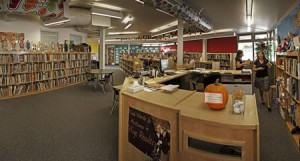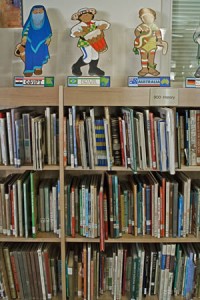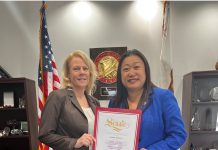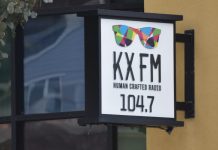
Laguna Beach parent Amy Jackson, whose youngest child of four is a high school sophomore, expressed dismay after visiting the remodeled Top of the World Elementary library. “Where have all the books gone?” she asked, admitting a fear that “librarians, teachers, school administrators are no longer the keepers of books the way they used to be.”
Since well before the Spanish Inquisition, people took offense at the destruction of books, a depository of knowledge that some deemed heretical. Today, local librarians say books are banished for more pragmatic reasons: libraries are shrinking their stacks in part to give the public access to the burgeoning collective wisdom available through computers.
Some blame e-books or a reliance on digitized books for the diminished volume of hard copies in libraries. The Library of Congress, for example has been accused of accepting digital formats in lieu of printed copies of certain publications. Locally, however, librarians explain the reduced stacks as a reflection of the institution’s evolving role in bridging the digital divide for those who lack access to computers and online research tools. Recession induced funding constraints don’t help librarians solve their dilemma over the growing volume of new books and often decreasing capacity to house them.
Librarians routinely “weed out” books that have outlived their use, said Jenny Gasset, Laguna Beach library’s senior branch manager. If a book hasn’t been checked out for years, its content is scientifically outdated, or its information is shaped by the racism and sexism of its time, it has outlived its usefulness, say librarians, unlikely advocates for destruction.
 Yet, aggressive weeding instigated by library renovations and repurposing of shelf space can evoke a visceral reaction, as it did in Jackson. “I think it’s amazing that right under our nose, under the guise of remodeling and getting rid of old books, we are getting rid of thousands of volumes,” she said.
Yet, aggressive weeding instigated by library renovations and repurposing of shelf space can evoke a visceral reaction, as it did in Jackson. “I think it’s amazing that right under our nose, under the guise of remodeling and getting rid of old books, we are getting rid of thousands of volumes,” she said.
Visiting the TOW’s library renovation in 2007 while gathering used books for a sale, she found two large storerooms housing at least 1,000, if not more, discarded books, and no one could tell her what would become of them.
Emotions ran high during the renovation, recalled Brandy Lowry, TOW’s librarian, who is currently on maternity leave. Lowry said that she went over the list of discarded books with the principal and the PTA and made it available to anyone who wanted to see it.
Despite a reduction in the overall TOW collection, Lowry said a greater percentage of new books are now on the shelves. Selections are based on literature that teachers believe would compliment classroom instruction and book lists provided by the state and reading specialists, said principal Ron LaMotte.
“We do not discard books,” said LaMotte. Instead they are either donated or saved for a book swap.
However, Lois Wilcoxen, TOW’s 25-year librarian until retiring in 1997, had no problem culling books no longer fit for the shelves. But getting rid of cartloads of books required precautions because of the reaction it would provoke, she recalled. In the early 1960s when her husband Bill was a member of the school board, he said the board arranged to destroy textbooks she remembered as being outdated by burning them out of town so as not to upset residents.
Libraries serve their patrons based on their needs, said Gasset, and ceding shelf space to computer tables reflects a shift in priorities. The Internet stations at the Laguna Beach library provide a resource to those without home computers as “the only connection for people to do job hunting, and stay in touch with friends and family,” said Gasset.
Both Gasset and Andrea Dietze, bibliographic services manager for Orange County Public Libraries, admitted that patrons evince increasing interest in e-books, but say that has little to do with fewer books lining their shelves. The county’s circulation of books, CDs, magazines, and DVDs in the year ending June 30 was 7.7 million, 150,000 more than the previous year, with the biggest growth in eBook and eAudiobook circulation.
Gasset attributed the purchase of fewer books recently to a smaller budget, though more e-book purchases means fewer hard copies. And librarians across the board attest to greatly reduced hard copies of reference books and collections in their stacks in favor of computer research.
“Our non-fiction book orders are practically nil due to the excellent online resources available,” said Lillian Jones, Laguna Beach High School’s librarian, since “the qualified sites update often and outpace the time a book can be printed” making them more valuable for research. “The trick is to teach students to qualify the sites and not take everything on the Internet as true or unbiased,” she added.
But when it comes to fiction, Jones keeps that section updated with the latest editions. Of the LBHS library’s 13,493 books, 2,524 are fiction. Students check out an average of 10 to 15 non-textbooks daily, she said.
The LBHS library stacks also underwent extensive weeding recently to make room for an impressive media center, including 32 Macs and 32 PCs. “I like to call our library/media center the cybrary,” Jones said.
While she loves books, “our world has changed,” she said, and the importance of preparing students for the future by keeping them abreast of the latest technological tools should not be discounted.




